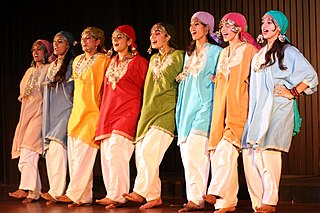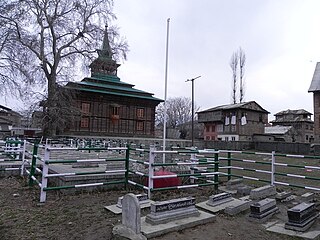Related Research Articles
Literature of Kashmir has a long history, the oldest texts having been composed in the Sanskrit language. Early names include Patanjali, the author of the Mahābhāṣya commentary on Pāṇini's grammar, suggested by some to have been the same to write the Hindu treatise known as the Yogasutra, and Dridhbala, who revised the Charaka Samhita of Ayurveda.

Shuja-ud-Daula was the Subedar and Nawab of Oudh and the Vizier of Delhi from 5 October 1754 to 26 January 1775.

Kashmiris are an Indo-Aryan ethnolinguistic group speaking the Kashmiri language and originating from the Kashmir Valley, which is today located in Indian-administered Jammu and Kashmir.
Dhar is a surname commonly found among the Hindu Bengali Kayastha community in West Bengal, India. Dhar or Dar is also used by some Kashmiri clans and communities native to the Kashmir Valley in Jammu and Kashmir, India, and common today among Kashmiri Hindus and Kashmiri Muslims.

The Roza Bal, Rouza Bal, or Rozabal is a shrine located in the Khanyar quarter in downtown area of Srinagar in Kashmir, India. The word roza means tomb, the word bal mean place. Locals believe a sage is buried here, Yuz Asaf, alongside another Muslim holy man, Mir Sayyid Naseeruddin.

Tyndale Biscoe School is a school in the Sheikh Bagh neighbourhood, in the Lal Chowk area of Srinagar, Jammu and Kashmir, India. The school was founded in 1880 CE and is one of the oldest schools in Jammu and Kashmir, the oldest being S.P school which was founded in 1874 CE. The school was started by Christian missionaries and was named after Canon Cecil Tyndale-Biscoe (1863–1949). It still has affiliations with the Church Mission Society. The first principal was Reverend J.H.Knowles.

The Nawab of Dhaka, originally spelt in English Nawab of Dacca, was the title of the head of one of the largest Muslim zamindar in British Bengal and Assam, based in present-day Dhaka, Bangladesh. The title of nawab, similar to the British peerage, was conferred upon the head of the family by Queen Victoria as a recognition of the first Nawab's loyalty and contribution to the social welfare activities.
Amin Kamil (1924–2014) was a Kashmiri poet.

Mazar-e-Shura is a cemetery on a small hill by the main road in Dalgate, an area of Srinagar, Jammu and Kashmir in India. Founded in the reign of the Mughul emperor Akbar the Great, it was built in a scenic location on the banks of the Dal Lake as a cemetery for eminent poets. Historical records show that there were five poets and men of letters buried in the cemetery, all natives of Iran who emigrated to India and were associated with the Mughal court. Only three tombstones are now visible as the place is neglected, overrun by weeds and littered with rubbish. One of the tombstones bears an inscription that is only partially legible.

Youza Asaf, Youza Asaph, Youza Asouph, Yuz Asaf, Yuzu Asaf, Yuzu Asif, or Yuzasaf, are Arabic and Urdu variations of the name Josaphat, and are primarily connected with Christianized and Islamized versions of the life of the Buddha found in the legend of Barlaam and Josaphat.

Ziyarat Naqshband Sahab is a Sunni Muslim shrine, or ziyarat, in Srinagar in Jammu and Kashmir, India. It is one of the traditional Mausoleums of the Hazrat Ishaans, who are descendants of Bahauddin Naqshband and Mughal royals. Besides the Ziyarat Naqshband Sahab in Srinagar, Kashmir, the Hazrat Ishaans have a Ziyarat in Lahore in Begampura.
Atiq Ullah or Atiqullah was acting Mirwaiz of Kashmir during the 1950s.

KashmirMartyrs' Day or Kashmir Day, was a former official state holiday observed in Kashmir in remembrance of 21 Muslim protesters killed on 13 July 1931 by Dogra forces of the princely state of Jammu and Kashmir.

Madin Sahib (Madeen Sahab or Madin Saeb) is a Mosque located in the Nowshera area of Srinagar, in the Indian union territory of Jammu and Kashmir. The other neighborhoods close to it would be Bagh-e-Ali Mardan Khan and Saz Ghar Poor. Madin Sahib Masjid was built by Sultan Zain-ul-Abideen (Budshah) in 1448. He named it after his teacher Syed Mohammad Madani, who is also buried to the left of the Masjid. Syed Mohammad Madani became Madin Saeb for Kashmiris.
Syed Madani came from Madeenah to India with Timur in 1398. He was sent to Kashmir as Timur's envoy to Sultan Sikander. Madin Sahib liked Kashmir so much that he decided to stay. He initially stayed in Rainawari after becoming a disciple of Syed Mohammad Hamadani. He later on moved close to Badshah's Capital Nowshahar, where Budshah built him the Khankhah. He died on 11 Rajab 849. Khwaja Baha-Ud-Din (Ganj-Bakhash) lead his funeral prayer. The tile work at Madin Saeb is considered one of the unique examples of this art and it is not seen anywhere else in Kashmir or Indian sub-continent for that matter.
Yousuf, born Yoūsuf (Yūsuf) Shāh Chak was the fourth and sixth Chak Sultan of Kashmir, who reigned from 1578 to 1586. Yousuf succeeded his father, Ali Shah Chak, who crowned Yousuf before he died. Yousuf defeated all the contenders for the throne, including his uncle Abdal Chak and ascended the throne in 1578.
Khawaja or Koshurkhwaja is an honorific title used as surname by vast majority of Kashmiri Muslims. The word comes from the Iranian word khwāja and translates as "master", "lord".
Mohammad Ashraf Khan, chiefly known as Ashraf Sehrai or just as Sehrai, was a Kashmiri separatist leader and chairman of Tehreek-e-Hurriyat, a Kashmiri separatist political party. He was elected chairman through a first-ever election conducted in the history of Hurriyat when Syed Ali Shah Geelani relinquished office due to his deteriorating health.
Husain, born Ḥusaīn Shāh Chak was the second Chak Sultan. He succeeded his brother Ghazi Shah Chak after Ghazi abdicated the throne in Husain's favour in 1563. Husain was the 30th Sultan of Kashmir and ruled Kashmir until 1570.
Khawaja Habibullah Nowsheri (Hubbi) was a Sufi poet born in Mohalla Nowshehra, Srinagar in 962 AH/1555 AD in the reign of Ali Shah.
References
- ↑ Prithivi Nath Kaul Bamzai Culture and Political History of Kashmir: Ancient Kashmir 1994 Page 38 "The tradition of writing history was continued by Khwaja Muhammad Azam Kaul of Didamar quarter of Srinagar, who flourished in Kashmir under the rule of the later Mughals. His history entitled Waquat-i-Kashmir was commenced in 1735 and completed in 1746. Khwaja Ahmad besides being a saintly person was also a poet and is the author of several works. He died in 1765. His son Khwaja Muhammad Aslam, is the author of Gauhar-i-Alam & history of Kashmir in which he has made considerable additions to his father's work. "
- ↑ Mohammad Yasin, Madhvi Yasin Mysteries and glimpses of Kashmir 1996 - Page 33 "The tradition of writing history was continued by Khwaja Muhammad Azam Didamari. His history entitled Waqiat-i-Kashmir or Tarikh-i-Azmi was commenced in 1735 and completed in 1746."
- ↑ K. K. Kusuman A Panorama of Indian Culture: Professor A. Sreedhara Menon 1990 - Page 318 "After Sheikh Abul Fazal, Khawaja Muhammad Azad Dedamari in his monumental book Waqiat-i-Kashmir (Persian) in A.H. 1179 (1765 A.D.) while describing the poets, mystics and calligraphers of Kashmir region, mentions Muhammad ..."
- ↑ Didamari, Khwaja Muhammad (Azam), Waqiat-i-Kashmir (Persian mas. R and P) K.U. (Urdu tr. by Munshi Ashraf Ali), Delhi, 1846.
- ↑ Didamari, Khwaja Muhammad 'Azam. 1998. Waqi'at-i-Kashmir [tr. Khwaja Hamid Yazdani]. Srinagar: Jammu
- ↑ Somnath Dhar Kalhana 1978 - Page 79 "Besides his literary attainments, Khawaja Muhammad Azam was held in esteen as a saint. After his death in 1765 A.D. his son, Khwaja Muhammad Aslam. adding to his work, wrote Gauhar-i-Alam (Jewels of the World)."